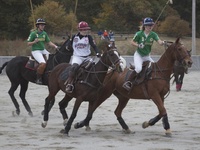Both Cissie and Crocker Snow are not intimidated by the tough task of coaching inexperienced players.
“It’s challenging but very rewarding at the same time,” Cissie Snow said. “It’s a matter of training them first to respect the horse [and then] to understand that they have feelings too.”
“We’re also getting kids who have never ridden before, ridden very little, or ridden in a different style,” Snow added. “[The progression] is from the horse, to the mallet, to actually playing the game.”
But while coaching new polo players may not be difficult for the Snows, finding funds for the teams is a constant struggle.
Even with yearly varsity dues of $1,250 and support from the Harvard Athletic Association, the teams do not have a large enough budget to afford a winterized barn or the 40-50 horses that well-established teams such as the University of Virginia and the University of Connecticut have.
Multimedia
But as with many Harvard sports, generous donations from alumni help bolster the teams’ resources. Perhaps the program’s biggest supporter is actor Tommy Lee Jones ’69, who hosts the teams at his Texas ranch for preseason riding and has donated a 12-horse truck and trailer along with several reliable ponies in the last three years.
Just as the teams have been given support from alumni and donors, the Harvard polo teams also have plans to give back. Currently, the club is working on adding a modest therapeutic riding program for the physically or mentally handicapped and other members of the Harvard community.
“There’s nothing like children with disabilities being with animals,” said University Disabilities Coordinator Marie Trottier. “I’ve seen the effects of putting them on the horse. And especially with soldiers coming back as wounded warriors back from Iraq and Afghanistan. It touches your heart in an amazing way, and I’m excited that we’re going to be doing that with Harvard polo.”
But therapy is not the sole purpose of the riding program.
“We just thought that it would help to give a better understanding of polo for people who don’t understand polo if we give therapeutic riding as well,” Trottier said.
That way, the club could gain some needed attention and, over time, accomplish its long-term goal: becoming a full-fledged varsity sport.
“One big disadvantage we face that other schools don’t is that we’re not able to recruit kids who played polo in high school because we’re a club sport,” women’s captain Samantha Drago wrote in an email.
But becoming a varsity sport would also have its drawbacks.
“The flip side to that is that people like me, who love riding but never played polo, might not get as many opportunities to play as they do now,” Drago added.









